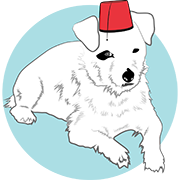Frankie is lucky. I’m not overly obsessed with housecleaning. Many people think that my home must be spotless, what with it doubling as my office and all, but when I want to avoid writing, clutter and dust never seem to demand my attention (my refrigerator, on the hand, practically grabs me by the throat). However, other dogs live with people who have a far more combative attitude towards dirt — and who are thus far more likely to inadvertently expose them to dangerous substances.
Imagine a toddler being allowed to crawl all around the house, licking the floor at will. Then imagine that she has a super-fast metabolism and smaller-than-human lung capacity.
Now you’ve got a picture of the average dog.
Your pup is not only at increased risk of encountering household cleaning toxins, but when she does, she’s breathing them in more rapidly and having more difficulty eliminating them from her body.
Surprise: The best way to prevent your dog from being exposed to dangerous chemicals is to avoid using products that contain them.
The most common offenders and cleaners in which they’re found include:
Ammonia: glass cleaners (combined with bleach, ammonia creates a poisonous chlorine gas)
Bleach: disinfectants and clothes whiteners
Formaldehyde: furniture polish
Monoethanolamine: oven, tub, tile, and carpet cleaners
Turpentine: furniture polishes
Phosphoric acid: liquid dishwasher detergents and bathroom cleaning products, especially those used on mildew and lime.
Not the type to mix vinegar, baking soda, peroxide, and salt to create your own safe cleaning solution? No problem. Green cleaning is in, even with the major manufacturers. It’s easy to find environment-friendly, nontoxic substitutes to tackle every area of your home that needs attention.
If you’re convinced you can’t find something that works as well as an unsafe product, make sure to keep your dog from whatever surface you’ve applied it to until it’s completely dry.
Of course, you’re not going to be able to divest your house of everything that’s potentially dangerous to your dog. In its animal poison control list, the ASPCA (click “Pet Care” and “Animal Poison Control”) warns against everything from cold medications to post-1982 pennies.
The bottom line: Get rid of what you can, minimize exposure to what you won’t, and store what you can’t away in a safe, inaccessible place. And keep the number of your vet and the ASPCA Animal Poison Control Center’s 24-hour hotline handy: 888-426-4435.
Update: Dr. Justine Lee wrote in about the Pet Poison Helpline, an additional Animal Poison Control Center staffed by veterinary specialists in internal medicine and emergency and critical care. The hotline number is 800-213-6680.
Adapted from AM I BORING MY DOG?And 99 Other Things Every Dog Wishes You Knew, forthcoming from Alpha/Penguin on September 1.
Speaking of which, if any manufacturers of green cleaning products are looking for a spokesdog, Frankie is available as soon as he finishes pitching my book.

Thanks for spreading the word on pet toxicities on your blog – so important for pet owners to be aware of the lurking household poisons in (and outside of) their house! As an ER specialist, I see so many toxicities that owners bring in too late (making it more expensive to treat, with a worse prognosis!). When in doubt, it’s so important to call a Poison Control for peace of mind!
I wanted to make you aware of another important resource out there also – Pet Poison Helpline is an additional Animal Poison Control Center, and it’s one of the most cost-effective animal poison ($35/case vs. ASPCA’s new $60/case) controls out there nowadays. Unfortunately, because animal poison controls are not federal- or state-funded, there is a fee to allow the service to be run 24-7. We provide a similar service, but have the added benefit of veterinary specialists (in internal medicine and emergency and critical care) as part of our staff. You can always call 1-800-213-6680 if you ever have a problem. Thanks for spreading the word!
Dr. Justine Lee, DVM, DACVECC
Associate Director of Veterinary Services
http://www.petpoisonhelpline.com
http://www.drjustinelee.com
Thank you so much in turn for the information about the Pet Poison Helpline. In fact, I will update this post to highlight the information so more people can learn about your important service.